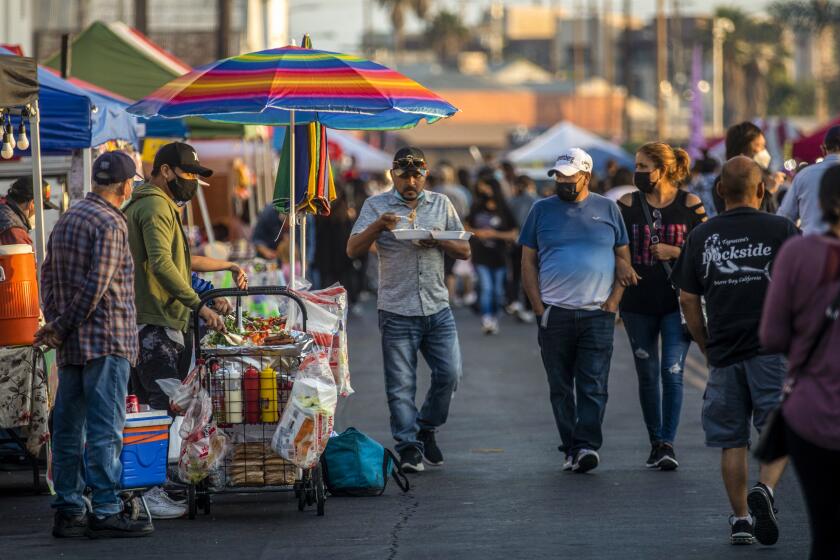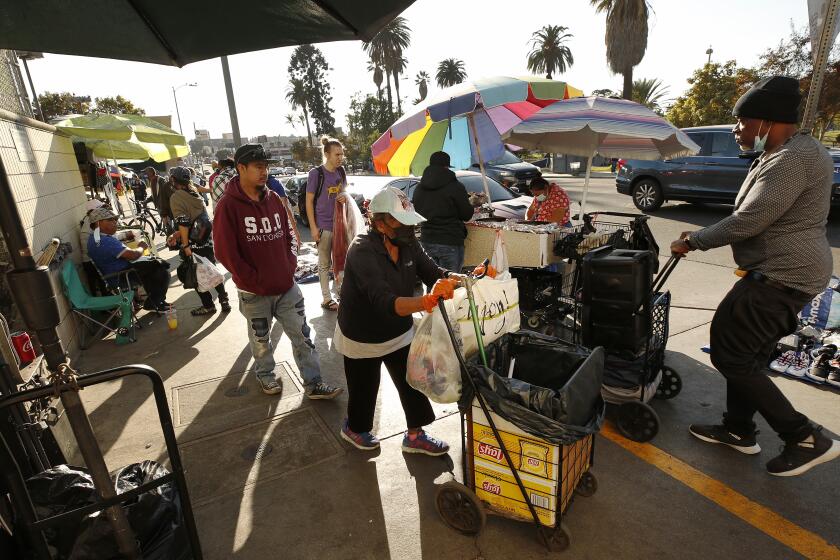L.A.’s sidewalk vendors have been hitting an obstacle: Legalizing their carts

- Share via
Local vendors who hawk tacos, hot dogs and other bites on Los Angeles sidewalks celebrated when politicians declared they were bringing them out of the shadows and would start permitting them to do business legally.
But L.A.’s push to legalize sidewalk vending has run into a persistently stubborn obstacle: the quest for legal carts.
“They’re requiring a cart that does not yet exist,” Pedro Barillas, who sells tacos in the San Fernando Valley, lamented in Spanish in front of a crowd of vendors gathered before Los Angeles City Hall earlier this summer.
Sidewalk vendors who sell food need a health permit from the Los Angeles County Department of Public Health — and to get that health permit, they need an approved cart.
But sidewalk sellers have complained that, for many kinds of street food, there haven’t been affordable carts on the market that fit on a sidewalk and meet a daunting set of state and local rules. Fruit carts are commonly spotted with a placard from the health department, but sellers of tacos, hot dogs and other street foods have long had more trouble.
One engineer recently announced a breakthrough, saying he had received county approval for blueprints for a tamale cart after a lengthy back-and-forth with the health department. Others have been pushing to craft a legal cart that keeps corn, tamales or hot dogs warm for the customer through a pilot program funded by the county.
But vendors and their advocates argue that it shouldn’t be this hard. Sidewalk vendors “are not looking for a free pass” but seeking to adapt the regulations to suit sidewalk carts, said Doug Smith, supervising senior staff attorney at Public Counsel, one of several groups that unveiled a new report Wednesday advocating for changes.
After gaining popularity on TikTok, the Lincoln Heights night market has been shut down following neighbors’ complaints about traffic, parking scarcity, garbage and other issues.
“What we have now is a much bigger health risk — a system that is literally impossible for much of this economy to comply with,” Smith said.
Among the rules that have frustrated vendors: California requires many “mobile food facilities” where food is cooked to have a sink with at least three compartments for washing kitchenware and utensils, as well as a separate sink for hand-washing.
Some carts also need to have a water heater that holds at least four gallons. And vendors who prepare food at open carts may be required to tote around a hefty amount of water — one tank holding five gallons for hand-washing, another with at least 15 gallons for ware-washing, the report found.
State law also restricts what kind of food can be prepared from an “unenclosed” cart. It bars such carts being used for reheating and “hot holding” potentially hazardous food — keeping it sitting at a hot temperature — with the exception of roasted corn, steamed hot dogs, and tamales, a carveout that the report questioned as “seemingly arbitrary.”
And state codes also prohibit food from being sliced or chopped on an unenclosed cart unless it is done on a heated cooking surface, which bans fruit from being cut at the cart.
Some of the California rules are stiffer than those in other vending hubs such as New York City, which does not require a sink with three compartments, according to the report from the UCLA School of Law Community Economic Development Clinic and Public Counsel, produced in partnership with the L.A. Street Vendor Campaign and other advocates.
The report found that Los Angeles County had piled on additional requirements, including a minimum amount of room for storage and refrigeration that strains the dimensions of a sidewalk cart. The L.A. County guidelines for someone selling hot dogs heated on the cart, for instance, would require at least nine cubic feet of dry storage and 12 cubic feet of refrigeration.
That would be enough room for 5,000 hot dogs — far more than a typical cart would need in a shift, the researchers concluded. And the new report argued that L.A. County should offer more vendors the option of sharing an auxiliary sink, which could make it easier for small carts to meet the sink requirements.
The L.A. County Department of Public Health said its rules were based on state codes. When California law isn’t specific about exact requirements, local jurisdictions are supposed to assess what is being served and how, it said.
“These interpretations are based on ensuring food offered to the public is properly protected and prepared safely,” the department said in an email. For instance, California mandates “adequate and suitable” storage space, which the county then translates into specific requirements to ensure the vendor “can safely store the food products needed to operate.”
The public health department also said some of the county requirements that had drawn criticism were in fact required under state rules, including a fire suppression system that extends over cooking equipment, which it attributed to the California Mechanical Code. The report argued that, under the California Retail Food Code, a fire extinguisher could suffice on an unenclosed cart.
Vendors say the mobile facilities that do meet the rules for hot food are too big for a sidewalk and too costly for entrepreneurs who make an average of $15,000 annually, according to a survey by vendor advocates.
“We want to work within their rules,” said Natalia Hernandez Jimenez, who sells tacos, huaraches and quesadillas in Pacoima. In the past, she said, she went to the health department to seek a permit and was told that she couldn’t do so unless she had a “mini-trailer” or truck. “But they should also consider our needs.”
Benjamin Chapman, a professor and food safety extension specialist at North Carolina State University, said regulators shouldn’t create different “tiers of safety” for different kinds of dining. Health departments, however, can and should offer case-by-case “variances” to entrepreneurs who show they can find alternative ways to protect consumers, he said.
“I’ve seen very practical approaches,” such as using separate buckets for washing, rinsing and sanitizing, Chapman said. “It doesn’t have to be a $4,000 or $5,000 solution.”
The report suggested that, to safely loosen the sink requirements, vendors could be allowed to set aside dirty dishes throughout the day to wash later, or bring multiple sets of utensils that are swapped throughout the day.
The California Department of Public Health said in a statement that the state law was not meant to restrict any particular kind of food service, but “the overall safeguards for prevention of food-borne illness are the same, whether the food is handled at a restaurant or a sidewalk pushcart.”
The department said the sink rules, for instance, ensured that washing, rinsing and sanitizing were performed separately to avoid inactivating the sanitizer, and that the sinks needed to be deep enough to submerge “food service size utensils.” Other rules limiting what kind of cooking can be done on open-air pushcarts are meant to prevent dangerous microorganisms from growing when food is cooled and reheated, the department said.
Matt Geller, CEO of Best Food Trucks and the National Food Truck Assn., said that when Los Angeles leaders were publicly declaring that sidewalk vending would soon be legal, he complained that they were giving people false hope.
“It was this rush to have everybody pat themselves on the back without an actual pathway” to permits, Geller said.
Only a small fraction of the estimated thousands of vendors who sell food — fewer than 200 as of Monday morning — have received L.A. city permits, which require the sellers to first obtain the L.A. County health permit. Vendors and their advocates complain that, this summer, public health investigators have tossed out vendors’ food in Westlake and Glassell Park.
The Department of Public Health said its enforcement procedures had not changed but that complaints about unpermitted vending had risen due to “elevated concerns” involving the pandemic. Last year, the department received more than 3,700 complaints about unpermitted sidewalk vendors.
“I’m all in favor of relaxing some of the requirements,” said Jeff Zarrinnam, a board member with the East Hollywood Business Improvement District, who has raised concerns about trash left behind by vendors lining Vermont Avenue. “But then there has to be enforcement.”
The Los Angeles City Council recently reinstituted a moratorium on city citations for vendors for lacking permits, but that does not affect the county’s enforcement of its own rules.
At a June rally outside City Hall, vendors hoisted a hulking cardboard model of an imaginary cart that they said could meet the myriad requirements for sinks, refrigeration and other mandated features. “Does anybody imagine a cart this size on the corner?” said Sergio Jimenez, an organizer with Community Power Collective, spurring shouts of “No!” from the crowd.

Hollywood vendor Merlin Alvarado has a fruit cart permitted by the health department, but she also sells hot dogs from a “pirated” cart fashioned at home. Alvarado complained that she had no realistic option to buy a legal hot dog cart that would be small enough to push around, but “I’m going to keep going because I have rent to pay,” she said in Spanish.
Jon Scudder, who owns a licensed cart called Coffee Express in the Chinatown area, said people shouldn’t be preparing food without gloves or a way to wash their utensils, but there’s room to scale down the requirements.
“We shouldn’t have to carry 20 gallons of water,” Scudder said. “Do you know how much 20 gallons of water weighs?”
Los Angeles County has been funding a pilot program that includes developing a legal cart for sidewalk vendors. Naria Kiani, senior planning coordinator with Kounkuey Design Initiative, said their nonprofit had initially aimed to design a cart for cooked meat such as tacos or bacon-wrapped hot dogs.
Under a proposal, the city of L.A. would not issue citations to food vendors who lack permits, focusing instead on education and outreach to vendors.
Kiani quickly found, however, that following the rules for cooking meat would result in a prohibitively costly and heavy cart, potentially more than 1,200 pounds with all of the mandated elements, she said. The sink space alone would take up much of the feasible footprint for a sidewalk cart, Kiani added.
So the pilot program shifted its focus to a “hot holding” cart that keeps corn, tamales or hot dogs warm for the customer. One major advantage is that such a cart doesn’t need a three-compartment sink for washing utensils, only a single sink for hand-washing, Kiani said.
Their plan is in the early stages, with a blueprint still going through the approval process with the public health department. Another effort was undertaken by Richard Gomez, an engineer and designer with Revolution Carts, who worked with Community Power Collective and other groups to design a tamale cart that could pass muster.
“We went line item by line item” with the health department, Gomez said. “Every line was a question — why couldn’t we do it?”
Gomez said their blueprints won approval, and he plans to roll out the cart to vendors this month, at a price tag of $7,500. But devising legal carts for many other hot foods remains a conundrum. Before Gomez gained approval for his tamale cart, he said he struggled to get sign-off for a grill cart, bouncing ideas off the public health department for years.
And a cart isn’t the only obstacle for local vendors. The new report outlined many other barriers, including state rules requiring food sellers to store and service carts at approved facilities called commissaries that have not been easily accessible to vendors, holding county inspections at a single site that is hard to reach for many vendors, and county fees ranging from roughly $1,100 to $1,700.
As a result, the report concluded, “most sidewalk food vendors remain exposed to the daily threat of ticketing, harassment and fines, which perpetuate an unending cycle of criminalization and poverty.”
More to Read
Sign up for Essential California
The most important California stories and recommendations in your inbox every morning.
You may occasionally receive promotional content from the Los Angeles Times.

















